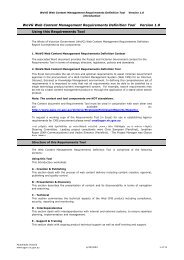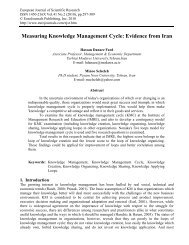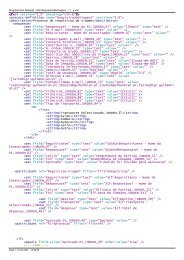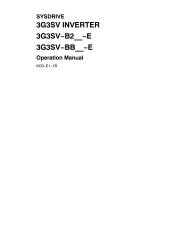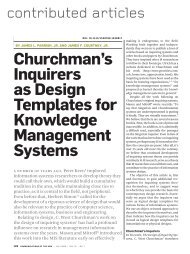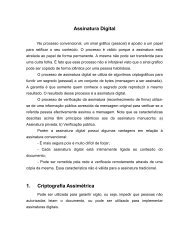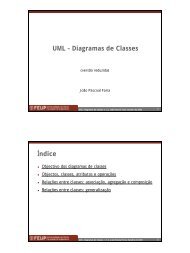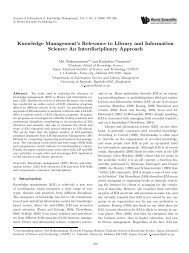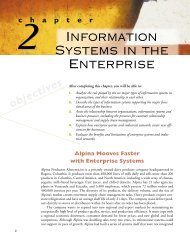Librarianship in the 21st Century-Crisis or Transformation?
Librarianship in the 21st Century-Crisis or Transformation?
Librarianship in the 21st Century-Crisis or Transformation?
Create successful ePaper yourself
Turn your PDF publications into a flip-book with our unique Google optimized e-Paper software.
<strong>Librarianship</strong> <strong>in</strong> <strong>the</strong> <strong>21st</strong> <strong>Century</strong>-<strong>Crisis</strong><br />
<strong>or</strong> Transf<strong>or</strong>mation<br />
Candy Davis<br />
ABSTRACT. The auth<strong>or</strong> argues that <strong>the</strong> profession of librarianship is<br />
<strong>in</strong> crisis. She seeks to identify <strong>the</strong> characteristics and analyse <strong>the</strong><br />
qualities of this phenomenon <strong>in</strong> <strong>or</strong>der to draw conclusions about<br />
future trends and directions f<strong>or</strong> <strong>the</strong> profession. It is argued that this<br />
crisis is an outward sign of a deeper transf<strong>or</strong>mation which is tak<strong>in</strong>g<br />
place and which affects <strong>the</strong> discipl<strong>in</strong>e as a whole <strong>in</strong>clud<strong>in</strong>g education<br />
and practice. The recent evolution of <strong>the</strong> profession is traced aga<strong>in</strong>st<br />
<strong>the</strong> background of <strong>the</strong> broader transition from <strong>the</strong> modern to <strong>the</strong><br />
postmodern era. The object is to reveal how <strong>the</strong> widespread social,<br />
cultural and technological changes of <strong>the</strong> <strong>21st</strong> century are impact<strong>in</strong>g<br />
on <strong>the</strong> library, <strong>the</strong> librarian, <strong>the</strong> customer <strong>or</strong> client and <strong>the</strong><br />
fundamental nature of <strong>in</strong>f<strong>or</strong>mation itself.<br />
KEYWORDS. Reputation of Librarians, Image of Librarians,<br />
Intellectual Basis of <strong>Librarianship</strong>, <strong>Librarianship</strong><br />
At <strong>the</strong> beg<strong>in</strong>n<strong>in</strong>g of <strong>the</strong> <strong>21st</strong> century, <strong>the</strong> profession of librarianship<br />
f<strong>in</strong>ds itself <strong>in</strong> a state of crisis. Nowhere is this m<strong>or</strong>e apparent than <strong>in</strong><br />
<strong>the</strong> discourse amongst librarians <strong>the</strong>mselves. Desperate to slough off<br />
Candy Davis holds an MA <strong>in</strong> Inf<strong>or</strong>mation Studies from <strong>the</strong> University of<br />
South Australia. She is <strong>the</strong> Community Research Officer, City of Marion,<br />
South Australia. She can be reached at 20B Partridge Street, Goolwa, SA<br />
5214, Australia <strong>or</strong> at candy.davis@lizzy.com.au.<br />
The auth<strong>or</strong> published this article us<strong>in</strong>g <strong>the</strong> name Candy Hillenbrand. It<br />
was published <strong>in</strong> <strong>the</strong> Australian Library Journal 54:2 (2005). It is repr<strong>in</strong>ted<br />
here with <strong>the</strong> permission of <strong>the</strong> auth<strong>or</strong> and <strong>the</strong> ALIA.<br />
Public Library Quarterly, Vol. 27(1) 2008<br />
Available onl<strong>in</strong>e at http://plq.haw<strong>or</strong>thpress.com<br />
© 2008 by The Haw<strong>or</strong>th Press. All rights reserved.<br />
doi: 10.1080/01616840802122401 57
58 PUBLIC LIBRARY QUARTERL Y<br />
<strong>the</strong> old limit<strong>in</strong>g, stereotypes of <strong>the</strong> stern bespectacled cardigan-clad<br />
shush<strong>in</strong>g controller of books, librarians are clamour<strong>in</strong>g to conv<strong>in</strong>ce<br />
<strong>the</strong>mselves, each o<strong>the</strong>r and <strong>the</strong> wider community that <strong>the</strong>re is far<br />
m<strong>or</strong>e to <strong>the</strong> humble librarian than meets <strong>the</strong> casual eye. Numerous<br />
websites are devoted to extoll<strong>in</strong>g <strong>the</strong> gl<strong>or</strong>ies and cement<strong>in</strong>g <strong>the</strong><br />
collective pride of <strong>the</strong> disaffected 'new' librarian of <strong>the</strong> <strong>21st</strong> century<strong>the</strong><br />
'New Breed Librarian', 'Anarchist Librarian', 'The Shifted<br />
Librarian', 'Progressive Librarian', 'Underground Librarian',<br />
'Street Librarian', 'Belly Danc<strong>in</strong>g Librarian', not to mention <strong>the</strong><br />
'Naked Librarian' and <strong>the</strong> 'Modified Librarian' boast<strong>in</strong>g body<br />
pierc<strong>in</strong>gs and tattoos. Perhaps Shelley Howells sums up this striv<strong>in</strong>g<br />
towards a redef<strong>in</strong>ed identity best <strong>in</strong> her article, 'The secret life of<br />
tattooed and bellydanc<strong>in</strong>g librarians':<br />
. . . 'Librarians rock. That reputation <strong>the</strong>y have <strong>in</strong>volv<strong>in</strong>g buns,<br />
sensible shoes and shush<strong>in</strong>g people is merely a cunn<strong>in</strong>g ruse,<br />
developed over centuries, to conceal <strong>the</strong>ir real lives as radicals,<br />
subversives and providers of extreme helpfulness' (Howells,<br />
2003).<br />
This preoccupation with challeng<strong>in</strong>g traditional stereotypes and<br />
images, while at <strong>the</strong> same time seek<strong>in</strong>g reassurance and justification f<strong>or</strong><br />
why and how librarians do what <strong>the</strong>y do, is merely one of a number of<br />
symptoms of a deeper malaise <strong>or</strong> 'condition of discomf<strong>or</strong>t'' underly<strong>in</strong>g<br />
<strong>the</strong> library profession. O<strong>the</strong>r symptoms can be found <strong>in</strong> <strong>the</strong> profession's<br />
difficulty <strong>in</strong> nam<strong>in</strong>g itself-<strong>the</strong>re is much debate about whe<strong>the</strong>r to call<br />
oneself a librarian, <strong>in</strong>f<strong>or</strong>mation scientist, <strong>in</strong>f<strong>or</strong>mation manager <strong>or</strong><br />
knowledge w<strong>or</strong>ker. Is <strong>the</strong> object, purpose <strong>or</strong> product of our w<strong>or</strong>k data,<br />
<strong>in</strong>f<strong>or</strong>mation <strong>or</strong> knowledge Do we address <strong>the</strong> members of <strong>the</strong><br />
communities we serve as clients, customers, patrons, users, consumers,<br />
stakeholders <strong>or</strong> <strong>the</strong> m<strong>or</strong>e ubiquitous 'b<strong>or</strong>rowers' The <strong>in</strong>f<strong>or</strong>mation<br />
sett<strong>in</strong>gs, <strong>or</strong> libraries, from which our profession arises are today places<br />
<strong>in</strong> flux, change and uncerta<strong>in</strong>ty. Government policy <strong>in</strong>itiatives such as<br />
<strong>the</strong> 2020 Vision rep<strong>or</strong>t of <strong>the</strong> Cultural M<strong>in</strong>isters' Council urge public<br />
libraries to adopt a bus<strong>in</strong>ess <strong>or</strong> retail model and to strive to add value to<br />
customer services <strong>in</strong> an economy where <strong>in</strong>f<strong>or</strong>mation is <strong>the</strong> new<br />
commodity (Mercer, 1996). M<strong>or</strong>eover, rapid advances <strong>in</strong> <strong>in</strong>f<strong>or</strong>mation<br />
technology have delivered <strong>the</strong> <strong>in</strong>f<strong>or</strong>mation superhighway with its<br />
attendant phenomena of <strong>in</strong>f<strong>or</strong>mation overload.
Candy Davis 59<br />
Not only is <strong>the</strong> library as place chang<strong>in</strong>g, but <strong>the</strong> nature of<br />
<strong>in</strong>f<strong>or</strong>mation itself is be<strong>in</strong>g transf<strong>or</strong>med through <strong>the</strong> shift from l<strong>in</strong>ear<br />
text-based <strong>in</strong>f<strong>or</strong>mation environments to <strong>the</strong> netw<strong>or</strong>ked hyperl<strong>in</strong>ked<br />
non-l<strong>in</strong>ear environment of <strong>the</strong> Internet. Our politicians have begun to<br />
recognise <strong>the</strong> crucial role played by <strong>in</strong>f<strong>or</strong>mation <strong>in</strong> <strong>the</strong> <strong>21st</strong> century.<br />
Inf<strong>or</strong>mation has now been acknowledged as <strong>the</strong> new currency of<br />
democracy and <strong>in</strong>itiatives like <strong>the</strong> Federal Government's NOIE<br />
(National Office f<strong>or</strong> <strong>the</strong> Inf<strong>or</strong>mation Economy)^ and <strong>the</strong> Federal<br />
Opposition's 'Knowledge Nation'^ have begun to solidify <strong>the</strong> rhet<strong>or</strong>ic<br />
<strong>in</strong>to policy. Little wonder, <strong>the</strong>n, that librarians should f<strong>in</strong>d <strong>the</strong>mselves<br />
<strong>in</strong> <strong>the</strong> midst of a professional identity crisis amidst cultural, social,<br />
economic and technological changes of such sweep<strong>in</strong>g prop<strong>or</strong>tions.<br />
A PARADIGM SHIFT<br />
This article will seek to identify <strong>the</strong> characteristics and qualities of<br />
this crisis <strong>in</strong> an attempt to draw some conclusions about future trends<br />
and directions f<strong>or</strong> <strong>the</strong> profession. The argument put f<strong>or</strong>ward is that<br />
<strong>the</strong> symptoms of <strong>the</strong> crisis are outward signs of a deeper<br />
transf<strong>or</strong>mation which is tak<strong>in</strong>g place with<strong>in</strong> <strong>the</strong> profession. This<br />
transf<strong>or</strong>mation is demonstrated by an evolutionary shift with<strong>in</strong> <strong>the</strong><br />
discipl<strong>in</strong>e from Library Studies to Inf<strong>or</strong>mation Science to Knowledge<br />
Management. What can be described as a paradigmatic change<br />
with<strong>in</strong> <strong>the</strong> profession will be traced aga<strong>in</strong>st <strong>the</strong> background of <strong>the</strong><br />
transition from <strong>the</strong> modern to <strong>the</strong> postmodern era. F<strong>or</strong> <strong>the</strong> purposes<br />
of this study, <strong>the</strong> dist<strong>in</strong>guish<strong>in</strong>g features of <strong>the</strong>se two paradigms can<br />
be briefly del<strong>in</strong>eated as:<br />
• <strong>the</strong> modern era-<strong>the</strong> age of science; enlightenment; <strong>the</strong><br />
Newtonian w<strong>or</strong>ld view characterised by <strong>or</strong>der, predictability,<br />
objectivity, rationality, neutrality; with librarians as 'guardians<br />
of truth' and libraries as 'temples of knowledge'; 'knowledge is<br />
power'; <strong>in</strong>f<strong>or</strong>mation science.<br />
• <strong>the</strong> post modern era-<strong>the</strong> netw<strong>or</strong>ked hypermedia <strong>in</strong>f<strong>or</strong>mation<br />
age; post-structuralist w<strong>or</strong>ld view characterised by subjectivity,<br />
relativity, chaos, unpredictability; knowledge is socially constructed<br />
and context-dependent; 'shar<strong>in</strong>g knowledge is power';<br />
knowledge management.
60 PUBLIC LIBRARY QUARTERLY<br />
The characteristics of this transf<strong>or</strong>mation will be exam<strong>in</strong>ed with<br />
reference to each of <strong>the</strong> elements that comb<strong>in</strong>e to f<strong>or</strong>m <strong>the</strong> profession<br />
as a whole-which f<strong>or</strong> <strong>the</strong> purposes of this paper will now be referred<br />
to as Library and Inf<strong>or</strong>mation Science (<strong>or</strong> LIS). These elements<br />
consist of:<br />
• The discipl<strong>in</strong>e of LIS via its <strong>the</strong><strong>or</strong>etical <strong>or</strong> epistemological<br />
foundations.<br />
• Education f<strong>or</strong> LIS.<br />
• The profession.<br />
• The place of LIS (<strong>the</strong> library <strong>or</strong> <strong>in</strong>f<strong>or</strong>mation sett<strong>in</strong>g) and <strong>the</strong><br />
community (of users and arguably non-users) served by LIS.<br />
THE DISCIPLINE<br />
The discipl<strong>in</strong>e can be broadly def<strong>in</strong>ed as <strong>the</strong> <strong>the</strong><strong>or</strong>etical body of<br />
knowledge which is taught to students, exchanged amongst<br />
educat<strong>or</strong>s, studied by researchers, and communicated between<br />
professionals <strong>in</strong> <strong>the</strong> field. It can be surveyed via LIS university<br />
course curricula, conference proceed<strong>in</strong>gs, published literature,<br />
discourse on Internet Listservs, and so on.<br />
Underly<strong>in</strong>g any discipl<strong>in</strong>ary body of knowledge are c<strong>or</strong>e assumptions,<br />
overarch<strong>in</strong>g <strong>the</strong><strong>or</strong>ies and various philosophical positions.<br />
These <strong>the</strong><strong>or</strong>etical and philosophical positions (<strong>or</strong> ways of th<strong>in</strong>k<strong>in</strong>g<br />
and <strong>the</strong>ref<strong>or</strong>e know<strong>in</strong>g) are referred to as epistemologies.<br />
Epistemology is def<strong>in</strong>ed as <strong>the</strong> 'study <strong>or</strong> <strong>the</strong><strong>or</strong>y of knowledge"^ and<br />
'<strong>the</strong> study of our right to <strong>the</strong> beliefs we have'.^ Obviously, a discipl<strong>in</strong>e<br />
which has <strong>the</strong> very phenomena of <strong>in</strong>f<strong>or</strong>mation and hence knowledge<br />
as its primary focus, needs to be clear about what constitutes its<br />
underly<strong>in</strong>g <strong>the</strong><strong>or</strong>ies of and beliefs about knowledge. At least two<br />
quite oppos<strong>in</strong>g epistemologies <strong>or</strong> <strong>the</strong><strong>or</strong>ies of knowledge can be<br />
identified-positivism and postmodernism.<br />
Positivism<br />
The term was co<strong>in</strong>ed by French sociologist Auguste Comte <strong>in</strong> <strong>the</strong><br />
mid-n<strong>in</strong>eteenth century to describe <strong>the</strong> evolution of human thought<br />
through <strong>the</strong>ological and metaphysical stages to a superi<strong>or</strong> scientific
Candy Davis 61<br />
stage.^ Acc<strong>or</strong>d<strong>in</strong>g to <strong>the</strong> positivist epistemology, 'all genu<strong>in</strong>e human<br />
knowledge is conta<strong>in</strong>ed with<strong>in</strong> <strong>the</strong> boundaries of science, that is <strong>the</strong><br />
systematic study of phenomena and <strong>the</strong> explication of <strong>the</strong> laws<br />
conta<strong>in</strong>ed <strong>the</strong>re<strong>in</strong>'.^ This scientific <strong>the</strong><strong>or</strong>y of how-<strong>the</strong>-w<strong>or</strong>ld-w<strong>or</strong>ks is<br />
thus characterised by notions of <strong>or</strong>der, certa<strong>in</strong>ty, rationalism,<br />
empiricism and predictability. It concerns itself with that which can<br />
be reduced <strong>in</strong>to units, observed, measured, quantified and ultimately<br />
known.<br />
Postmodernism<br />
Postmodernism, on <strong>the</strong> o<strong>the</strong>r hand, not only criticises but rejects<br />
what it calls 'meta-narratives', a term co<strong>in</strong>ed by <strong>the</strong> French<br />
philosopher, Jean-Francois Lyotard, to describe universal allencompass<strong>in</strong>g<br />
<strong>the</strong><strong>or</strong>ies such as positivism <strong>or</strong> Marxism (Lyotard,<br />
1991). It could be argued that postmodernism, <strong>in</strong> its critique of<br />
positivism, itself risks becom<strong>in</strong>g yet ano<strong>the</strong>r universalis<strong>in</strong>g <strong>the</strong><strong>or</strong>y. On<br />
<strong>the</strong> contrary, postmodern philosophers argue that postmodern<br />
science is a 'search f<strong>or</strong> paradoxes, <strong>in</strong>stabilities and <strong>the</strong> unknown,<br />
ra<strong>the</strong>r than an attempt to construct yet ano<strong>the</strong>r grand narrative that<br />
would apply over <strong>the</strong> entire scientific community' (Sim, 1998, p9).<br />
The term has been used to describe a quite complex philosophical<br />
and epistemological approach as well as a general cultural movement<br />
which is sceptical and critical of <strong>the</strong> values, pr<strong>in</strong>ciples and<br />
assumptions that have come to dom<strong>in</strong>ate Western society s<strong>in</strong>ce <strong>the</strong><br />
Age of Enlightenment. Antony Easthope, <strong>in</strong> his essay 'Postmodern<br />
and Critical and Cultural The<strong>or</strong>y' lists a cluster of effects which have<br />
been associated with postmodernism:<br />
• Scepticism about <strong>the</strong> Enlightenment view that reason may rely<br />
on a firm foundation f<strong>or</strong> decid<strong>in</strong>g between truth and falsehood,<br />
a tradition closely bound up with science.<br />
• Uncerta<strong>in</strong>ty about traditional humanism and ideas of progress.<br />
• An absolutely unprecedented development <strong>in</strong> <strong>the</strong> mass media,<br />
especially visual media (television, film, advertis<strong>in</strong>g) s<strong>in</strong>ce 1950.<br />
• Widespread prosperity that seems to be here to stay, express<strong>in</strong>g<br />
itself <strong>in</strong> consumerism.<br />
• The weaken<strong>in</strong>g of any sense of central social auth<strong>or</strong>ity <strong>in</strong> favour<br />
of a plurality of acceptable ethics and lifestyles (Easthope, 1998,<br />
p21).
62 PUBLIC LIBRARY QUARTERL Y<br />
This epoch from which postmodernism has emerged is referred to<br />
as modernity. Indeed, implied with<strong>in</strong> <strong>the</strong> w<strong>or</strong>d postmodernism is <strong>the</strong><br />
suggestion that <strong>the</strong> postmodern has somehow grown out of <strong>the</strong><br />
modern. Yet Lyotard does not see postmodernism strictly as that<br />
which follows modernism <strong>in</strong> a l<strong>in</strong>ear fashion but ra<strong>the</strong>r 'as a cyclical<br />
movement that returns bef<strong>or</strong>e <strong>the</strong> emergence of ever new modernisms'<br />
(Jameson, <strong>in</strong> Lyotard, 1991).^<br />
A grow<strong>in</strong>g number of <strong>the</strong><strong>or</strong>etical researchers are analys<strong>in</strong>g <strong>the</strong><br />
traditional epistemological foundations of Library and Inf<strong>or</strong>mation<br />
Science and propos<strong>in</strong>g alternative epistemologies grounded <strong>in</strong><br />
postmodernism, hermeneutics and discourse analysis. The movement<br />
towards use-centred and cognitive approaches to research <strong>in</strong><br />
Inf<strong>or</strong>mation Retrieval can also be seen as parallel developments <strong>in</strong><br />
<strong>the</strong> field.<br />
APPLICATIONS OF POSITIVIST AND POSTMODERN<br />
EPISTEMOLOGIES TO LIS<br />
John Budd asserts that <strong>the</strong> field, alongside most of <strong>the</strong> discipl<strong>in</strong>es<br />
<strong>in</strong> <strong>the</strong> social sciences, has long been dom<strong>in</strong>ated by <strong>the</strong> positivist mode<br />
of th<strong>in</strong>k<strong>in</strong>g (Budd, 1995). The application of <strong>the</strong> scientific method to<br />
library and <strong>in</strong>f<strong>or</strong>mation science can be observed <strong>in</strong> current attempts<br />
to empirically observe and predict <strong>in</strong>f<strong>or</strong>mation-seek<strong>in</strong>g behaviour, to<br />
measure relevance us<strong>in</strong>g quantitative methodologies, and ultimately<br />
to isolate <strong>the</strong> person <strong>or</strong> user from <strong>the</strong> <strong>in</strong>f<strong>or</strong>mation system s/he is<br />
us<strong>in</strong>g. An underly<strong>in</strong>g assumption of <strong>the</strong> positivist method, <strong>the</strong>ref<strong>or</strong>e,<br />
is that 'human phenomena can be reduced to physical phenomena'<br />
(Budd, 1995, p 301).<br />
Gary Radf<strong>or</strong>d has added to <strong>the</strong> critique of <strong>the</strong> positivist<br />
epistemology with his description of <strong>the</strong> library <strong>in</strong> positivist terms<br />
as a 'metaph<strong>or</strong> f<strong>or</strong> <strong>or</strong>der and rationality. It represents, <strong>in</strong> <strong>in</strong>stitutional<br />
f<strong>or</strong>m, <strong>the</strong> ultimate realisation of a place where each item with<strong>in</strong> it has<br />
a fixed place and stands <strong>in</strong> a pri<strong>or</strong>i relationship with every o<strong>the</strong>r item'<br />
(Radf<strong>or</strong>d, 1998, p2).<br />
Radf<strong>or</strong>d cont<strong>in</strong>ues:<br />
The rationality of <strong>the</strong> library <strong>in</strong> many ways represents <strong>the</strong><br />
description of nature idealised by <strong>the</strong> <strong>in</strong>stitutions of positivist
Candy Davis 63<br />
science. As <strong>the</strong> library imposes a completely consistent system<br />
upon a collection of unique texts, so positivist science seeks <strong>the</strong><br />
system by which unique observations derived from nature can<br />
be <strong>or</strong>dered and classified acc<strong>or</strong>d<strong>in</strong>g to a set of general pr<strong>in</strong>ciples<br />
(Radf<strong>or</strong>d, 1998, p 2).<br />
Radf<strong>or</strong>d believes that this association of <strong>the</strong> library with<br />
rationality and <strong>or</strong>der underlies <strong>the</strong> common stereotype of <strong>the</strong><br />
librarian as stern, f<strong>or</strong>bidd<strong>in</strong>g and controll<strong>in</strong>g. While <strong>the</strong> 'librarian's<br />
doma<strong>in</strong> is that of <strong>the</strong> creation and ma<strong>in</strong>tenance of <strong>or</strong>der.... <strong>the</strong> library<br />
user represents a threat to that <strong>or</strong>der'. Acc<strong>or</strong>d<strong>in</strong>g to Radf<strong>or</strong>d, this<br />
fundamental tension between <strong>the</strong> librarian who seeks <strong>or</strong>der and <strong>the</strong><br />
library user who threatens that <strong>or</strong>der <strong>in</strong>f<strong>or</strong>ms <strong>the</strong> negative stereotypes<br />
of librarians (Radf<strong>or</strong>d, 1998, pp2-3). The positivist epistemology<br />
<strong>the</strong>ref<strong>or</strong>e affects how library users and librarians alike experience <strong>the</strong><br />
library.<br />
Postmodernism calls primarily f<strong>or</strong> a change <strong>in</strong> mental attitude and<br />
not merely <strong>the</strong> substitution of new <strong>the</strong><strong>or</strong>ies and methodologies f<strong>or</strong> <strong>the</strong><br />
old. In <strong>the</strong> context of LIS, <strong>the</strong> first step lies <strong>in</strong> becom<strong>in</strong>g aware of <strong>the</strong><br />
underly<strong>in</strong>g positivist epistemological foundation of library science.<br />
Quot<strong>in</strong>g Radf<strong>or</strong>d aga<strong>in</strong>:<br />
The next step is <strong>the</strong> consideration of this stance as particular<br />
ra<strong>the</strong>r than absolute, as produced ra<strong>the</strong>r than natural, <strong>in</strong> a<br />
movement toward recognis<strong>in</strong>g <strong>the</strong> f<strong>or</strong>mation of alternative<br />
epistemological foundations that do not structure existence,<br />
values, and practice <strong>in</strong> <strong>the</strong> same manner as <strong>the</strong> positivist<br />
framew<strong>or</strong>k' (Radf<strong>or</strong>d, 1998, p4).<br />
In o<strong>the</strong>r w<strong>or</strong>ds, postmodern <strong>the</strong><strong>or</strong>ists attempt to resist <strong>the</strong><br />
construction of a postmodern discipl<strong>in</strong>e of <strong>in</strong>f<strong>or</strong>mation. They<br />
contend that what is fundamentally called f<strong>or</strong> is <strong>the</strong> application of<br />
<strong>the</strong> <strong>in</strong>sight that we exist <strong>in</strong> Lyotard's 'condition of postmodernity' to<br />
our discourse and debates <strong>in</strong> LIS. Conceivably, recognition of <strong>the</strong><br />
uncerta<strong>in</strong>ty and complexity of <strong>the</strong> postmodern w<strong>or</strong>ld <strong>in</strong> which we<br />
<strong>in</strong>habit will result <strong>in</strong> m<strong>or</strong>e <strong>in</strong>novative th<strong>in</strong>k<strong>in</strong>g <strong>in</strong> <strong>the</strong> field. The<br />
postmodern approach <strong>the</strong>ref<strong>or</strong>e does not provide answers-it asks<br />
questions.
64 PUBLIC LIBRAR Y QUARTERL Y<br />
INFORMA TION-THE PROFESSIONAL OBJECT OF LIS<br />
At this po<strong>in</strong>t, an attempt to def<strong>in</strong>e <strong>the</strong> fundamental object of <strong>the</strong><br />
LIS profession-<strong>in</strong>f<strong>or</strong>mation-is called f<strong>or</strong>. Just as doct<strong>or</strong>s practise<br />
medic<strong>in</strong>e and lawyers practise <strong>the</strong> law, librarians dispense <strong>in</strong>f<strong>or</strong>mation<br />
and knowledge. As Capurro po<strong>in</strong>ts out, <strong>the</strong>re are 134 notions of<br />
<strong>in</strong>f<strong>or</strong>mation <strong>in</strong> <strong>the</strong> LIS field which makes attempts to narrow its<br />
mean<strong>in</strong>g highly problematical (Capurro, 1999, p2).<br />
The w<strong>or</strong>d is derived from <strong>the</strong> Lat<strong>in</strong> <strong>in</strong>f<strong>or</strong>mare mean<strong>in</strong>g to shape <strong>or</strong><br />
f<strong>or</strong>m.^ The Macquarie Concise Dictionary l<strong>in</strong>ks <strong>in</strong>f<strong>or</strong>mation to <strong>the</strong><br />
concept of knowledge by def<strong>in</strong><strong>in</strong>g <strong>in</strong>f<strong>or</strong>mation as 'knowledge<br />
communicated <strong>or</strong> received concern<strong>in</strong>g some fact <strong>or</strong> circumstance'.<br />
Common def<strong>in</strong>itions with<strong>in</strong> <strong>the</strong> LIS field appear to centre on notions<br />
of '<strong>or</strong>ganised data' suggest<strong>in</strong>g that <strong>in</strong>f<strong>or</strong>mation is someth<strong>in</strong>g objective<br />
which exists outside <strong>the</strong> person (Terra & Angeloni, 2002, p2).<br />
Knowledge, on <strong>the</strong> o<strong>the</strong>r hand, is m<strong>or</strong>e complex, resid<strong>in</strong>g as it does<br />
with<strong>in</strong> <strong>the</strong> human m<strong>in</strong>d.<br />
Such traditional notions of <strong>in</strong>f<strong>or</strong>mation are challenged by<br />
postmodern <strong>the</strong><strong>or</strong>ists like Capurro who stress <strong>the</strong> <strong>in</strong>teraction between<br />
society and <strong>in</strong>f<strong>or</strong>mation systems-<strong>the</strong> social nature of <strong>in</strong>f<strong>or</strong>mation.<br />
Acc<strong>or</strong>d<strong>in</strong>g to Capurro, <strong>the</strong> nature of <strong>in</strong>f<strong>or</strong>mation is chang<strong>in</strong>g at <strong>the</strong><br />
end of <strong>the</strong> period of modernity. He outl<strong>in</strong>es three 'abandonments'<br />
characteris<strong>in</strong>g this shift-<strong>the</strong> abandonment of <strong>the</strong> primacy of scientific<br />
thought; <strong>the</strong> abandonment of <strong>the</strong> objective-subjective split; and <strong>the</strong><br />
abandonment of <strong>the</strong> Platonic idea of human knowledge as someth<strong>in</strong>g<br />
separate from <strong>the</strong> knower. Aris<strong>in</strong>g from <strong>the</strong>se propositions, <strong>in</strong> <strong>the</strong><br />
postmodern era, knowledge is relative, contextual and dependent on<br />
<strong>the</strong> knower's frame of reference. Inf<strong>or</strong>mation is acknowledged as<br />
'someth<strong>in</strong>g basically human' and 'modern knowledge is someth<strong>in</strong>g<br />
common, shared by a community'. M<strong>or</strong>eover, knowledge is no longer<br />
separate from <strong>the</strong> knower, and <strong>in</strong>f<strong>or</strong>mation has become a medium as<br />
a result of modern <strong>in</strong>f<strong>or</strong>mation technology (Capurro, 2000, pp 2-3).<br />
Indeed, Capurro refers to a 'Copernican revolution' <strong>in</strong> <strong>in</strong>f<strong>or</strong>mation<br />
science ak<strong>in</strong> to <strong>the</strong> paradigm shift from <strong>the</strong> Ptolemaic model of <strong>the</strong><br />
earth as centre of <strong>the</strong> universe to <strong>the</strong> Copernican revelation of <strong>the</strong><br />
earth revolv<strong>in</strong>g around <strong>the</strong> sun:<br />
Instead of consider<strong>in</strong>g knowledge someth<strong>in</strong>g static and permanent<br />
<strong>in</strong> <strong>the</strong> center of a (library) system, we are now aware of <strong>the</strong>
Candy Davis 65<br />
constitutive role played by <strong>the</strong> <strong>in</strong>terpreter and user of such<br />
schemes (Capurro, 1985, p 12)<br />
Education f<strong>or</strong> LIS<br />
The stated purpose of <strong>the</strong> University of South Australia's<br />
educational tra<strong>in</strong><strong>in</strong>g program f<strong>or</strong> librarianship, <strong>the</strong> Graduate<br />
Diploma <strong>in</strong> Inf<strong>or</strong>mation Studies, reads as follows:<br />
This program.... covers pr<strong>in</strong>ciples and practices <strong>in</strong>volved <strong>in</strong> <strong>the</strong><br />
selection, acquisition, <strong>or</strong>ganisation and presentation of a range<br />
of materials and <strong>in</strong>f<strong>or</strong>mation technologies, to provide effective<br />
services f<strong>or</strong> users. Emphasis is placed on <strong>the</strong> role of <strong>the</strong><br />
professional <strong>in</strong>f<strong>or</strong>mation manager as <strong>in</strong>termediary <strong>in</strong> <strong>the</strong> process<br />
of communication <strong>in</strong> a complex society."^<br />
While <strong>the</strong> course synopsis emphasizes <strong>the</strong> complexity of contemp<strong>or</strong>ary<br />
society and <strong>the</strong> role of communication processes <strong>in</strong><br />
<strong>in</strong>f<strong>or</strong>mation w<strong>or</strong>k, <strong>the</strong> primary focus is on <strong>the</strong> <strong>or</strong>ganisation and<br />
management of <strong>in</strong>f<strong>or</strong>mation which, as we have seen, reflects a<br />
positivist epistemological approach to LIS.<br />
Positivist versus postmodern trends <strong>in</strong> LIS education<br />
The discourse of postmodernism has penetrated many academic<br />
discipl<strong>in</strong>es <strong>in</strong>clud<strong>in</strong>g <strong>the</strong> social sciences, <strong>the</strong> 'hard' sciences, architecture,<br />
art, education, amongst numerous o<strong>the</strong>rs. Yet postmodernism<br />
appears to have 'only marg<strong>in</strong>ally imp<strong>in</strong>ged on <strong>the</strong> <strong>in</strong>f<strong>or</strong>mation<br />
and library sciences'. In part, this state of affairs can be attributed to<br />
<strong>the</strong> technical focus of librarianship and '<strong>the</strong> fixation of a predom<strong>in</strong>antly<br />
vocational discipl<strong>in</strong>ary field on practical problem solv<strong>in</strong>g<br />
ra<strong>the</strong>r than social and cultural <strong>the</strong><strong>or</strong>y' (Muddiman, 1999, p 1).<br />
Muddiman and o<strong>the</strong>rs argue that <strong>the</strong> 'problem' rests with LIS's<br />
uncritical acceptance of Enlightenment notions <strong>or</strong> 'narratives' of an<br />
<strong>or</strong>dered, rational and socially progressive '<strong>in</strong>f<strong>or</strong>mation age' <strong>in</strong> which<br />
<strong>in</strong>f<strong>or</strong>mation is central to modern life, and librarians, as managers of<br />
that <strong>in</strong>f<strong>or</strong>mation, are positioned to assume <strong>the</strong> pre-em<strong>in</strong>ent role of<br />
<strong>or</strong>ganisers and rulers of this <strong>in</strong>f<strong>or</strong>mation society (Muddiman, 1999,<br />
p 1). The claim is that if knowledge is power, <strong>the</strong>n surely librarians<br />
should rule <strong>the</strong> w<strong>or</strong>ld! The reality is that <strong>in</strong> this postmodern era of
66 PUBLIC LIBRARY QUARTERLY<br />
burgeon<strong>in</strong>g <strong>in</strong>f<strong>or</strong>mation technologies and <strong>the</strong> result<strong>in</strong>g pluralism,<br />
relativity and fragmentation of knowledge, <strong>the</strong> traditional <strong>in</strong>f<strong>or</strong>mation<br />
professions have failed to achieve such pre-em<strong>in</strong>ence. Indeed,<br />
acc<strong>or</strong>d<strong>in</strong>g to Muddiman:<br />
[<strong>the</strong>] postmodern critique helps to expla<strong>in</strong> <strong>the</strong> relative decl<strong>in</strong>e of<br />
librarianship and, to some degree <strong>in</strong>f<strong>or</strong>mation science, which are<br />
seen as associated hist<strong>or</strong>ically with <strong>the</strong> 'modern' project'<br />
(Muddiman, 1999, p 1).<br />
O<strong>the</strong>rs offer divergent reasons to expla<strong>in</strong> <strong>the</strong> problems which<br />
beset LIS education. Myburgh, f<strong>or</strong> example, believes <strong>the</strong> most<br />
dangerous threat to <strong>the</strong> profession is <strong>the</strong> 'librarian m<strong>in</strong>dset'<br />
(Myburgh, 2003, p2), while Kruk asserts that <strong>the</strong> 'postmodernist<br />
model of librarianship' poses <strong>the</strong> greatest threat to libraries (Kruk,<br />
2003, p229).<br />
Postmodern <strong>the</strong><strong>or</strong>ists <strong>in</strong> <strong>the</strong> LIS field are call<strong>in</strong>g f<strong>or</strong> new directions<br />
<strong>in</strong> <strong>the</strong> education of <strong>in</strong>f<strong>or</strong>mation professionals (Muddiman, 1999,<br />
Myburgh, 2003). They po<strong>in</strong>t to <strong>the</strong> flaws of <strong>the</strong> 'modern' project of<br />
LIS with its emphasis on an <strong>or</strong>dered enlightened <strong>in</strong>f<strong>or</strong>mation society<br />
that, by its very nature, excludes <strong>the</strong> cultures of large maj<strong>or</strong>ities of <strong>the</strong><br />
w<strong>or</strong>ld's population, construct<strong>in</strong>g <strong>in</strong>stead 'a privileged f<strong>or</strong>m of<br />
knowledge which, far from be<strong>in</strong>g universal, amounts to a partial<br />
yet dom<strong>in</strong>ant culture which is male, European, positivist and<br />
humanist' (Muddiman, 1999, p4).<br />
An <strong>in</strong>terest<strong>in</strong>g example of this 'culture of exclusion' can be seen <strong>in</strong><br />
The Library of Congress Subject Head<strong>in</strong>gs system of classification<br />
whereby 'man' is used as <strong>the</strong> subject head<strong>in</strong>g to represent 'human<br />
be<strong>in</strong>gs' and 'women' are found at <strong>the</strong> very bottom of <strong>the</strong> hierarchical<br />
list (Olsen, 1996):<br />
Man<br />
UF Human be<strong>in</strong>gs<br />
Humans<br />
Mank<strong>in</strong>d<br />
BT Primates<br />
RT Anthropology<br />
Human-animal relationships<br />
SA head<strong>in</strong>gs beg<strong>in</strong>n<strong>in</strong>g with <strong>the</strong> w<strong>or</strong>d Human
NT Economic man<br />
Ethnology<br />
Human biology<br />
Human-plant relationships<br />
Men<br />
Persons<br />
Philosophical anthropology<br />
Women<br />
Candy Davis 67<br />
In contrast to what is viewed as <strong>the</strong> prevail<strong>in</strong>g rationalistic<br />
patriarchal paradigm, fem<strong>in</strong>ist <strong>the</strong><strong>or</strong>ists and o<strong>the</strong>rs are call<strong>in</strong>g f<strong>or</strong> a<br />
new discipl<strong>in</strong>ary paradigm based on co-operative, participat<strong>or</strong>y,<br />
<strong>in</strong>terdiscipl<strong>in</strong>ary and non-hierarchical methodologies (Halligan and<br />
Crew, quoted <strong>in</strong> Muddiman, 1999, p4). Acc<strong>or</strong>d<strong>in</strong>g to Myburgh, LIS<br />
education 'is no longer technical, but must <strong>in</strong>clude consideration of<br />
new cognitive, social and situational processes' (Myburgh, 2003, p 1).<br />
Van House and Sutton argue that LIS is fast becom<strong>in</strong>g an<br />
endangered species, They ma<strong>in</strong>ta<strong>in</strong> that <strong>the</strong> '<strong>in</strong>f<strong>or</strong>mation problem'<br />
which lies at <strong>the</strong> heart of <strong>the</strong> LIS doma<strong>in</strong> has been largely<br />
misunderstood because '<strong>the</strong> traditional focus of LIS has not been<br />
on <strong>in</strong>f<strong>or</strong>mation at all but ra<strong>the</strong>r on its conta<strong>in</strong>ers'. Quot<strong>in</strong>g Barlow,<br />
who compared <strong>in</strong>f<strong>or</strong>mation to f<strong>in</strong>e w<strong>in</strong>e: 'We thought f<strong>or</strong> many years<br />
that we were <strong>in</strong> <strong>the</strong> w<strong>in</strong>e bus<strong>in</strong>ess. In fact, we were <strong>in</strong> <strong>the</strong> bottl<strong>in</strong>g<br />
bus<strong>in</strong>ess. And we don't know a damned th<strong>in</strong>g about w<strong>in</strong>e' (Van<br />
House & Sutton, i996, p4). If this argument is accepted, it goes some<br />
way towards expla<strong>in</strong><strong>in</strong>g why LIS now faces serious competitive<br />
challenges to its traditional jurisdiction from professionals <strong>in</strong> such<br />
fields as computer science, bus<strong>in</strong>ess studies and <strong>the</strong> communications<br />
discipl<strong>in</strong>e. LIS has found itself well beh<strong>in</strong>d <strong>the</strong> eight-ball <strong>in</strong><br />
recognis<strong>in</strong>g <strong>the</strong> emergence of <strong>in</strong>f<strong>or</strong>mation and knowledge as strategic<br />
commodities <strong>in</strong> <strong>the</strong> <strong>21st</strong> century.<br />
INFORMATION AND KNOWLEDGE AS STRATEGIC<br />
COMMODITIES<br />
The <strong>21st</strong> century has been variously referred to as <strong>the</strong> Inf<strong>or</strong>mation<br />
Age, <strong>the</strong> Age of <strong>the</strong> M<strong>in</strong>d and <strong>the</strong> Knowledge Society. In a global<br />
economy dom<strong>in</strong>ated by capitalism and w<strong>or</strong>ld debt, technological
68 PUBLIC LIBRARY QUARTERLY<br />
transf<strong>or</strong>mations fuelled by <strong>the</strong> unparalleled growth of <strong>the</strong> <strong>in</strong>ternet<br />
have served to transf<strong>or</strong>m knowledge <strong>in</strong>to a f<strong>or</strong>m of capital.<br />
Acc<strong>or</strong>d<strong>in</strong>g to Lyotard, over <strong>the</strong> last few decades, knowledge has<br />
become <strong>the</strong> 'pr<strong>in</strong>ciple f<strong>or</strong>ce of production'. He cont<strong>in</strong>ues:<br />
Knowledge <strong>in</strong> <strong>the</strong> f<strong>or</strong>m of an <strong>in</strong>f<strong>or</strong>mational commodity<br />
<strong>in</strong>dispensable to productive power is already, and will cont<strong>in</strong>ue<br />
to be, a maj<strong>or</strong>-perhaps <strong>the</strong> maj<strong>or</strong>-stake <strong>in</strong> <strong>the</strong> w<strong>or</strong>ldwide<br />
competition f<strong>or</strong> power. It is conceivable that <strong>the</strong> nation-states<br />
will one day fight f<strong>or</strong> control of <strong>in</strong>f<strong>or</strong>mation, just as <strong>the</strong>y battled<br />
<strong>in</strong> <strong>the</strong> past f<strong>or</strong> control over territ<strong>or</strong>y, and afterwards f<strong>or</strong> control<br />
of access to and exploitation of raw materials and cheap lab<strong>or</strong>.<br />
A new field is opened f<strong>or</strong> <strong>in</strong>dustrial and commercial strategies<br />
on <strong>the</strong> one hand, and political and military strategies on <strong>the</strong><br />
o<strong>the</strong>r (Lyotard, 1991, p5).<br />
In sh<strong>or</strong>t, <strong>in</strong> <strong>the</strong> postmodern era, knowledge has become<br />
synonymous with power. It can be produced, distributed, bought<br />
and sold:<br />
The relationship of <strong>the</strong> suppliers and users of knowledge to <strong>the</strong><br />
knowledge <strong>the</strong>y supply and use is now tend<strong>in</strong>g, and will<br />
<strong>in</strong>creas<strong>in</strong>gly tend, to assume <strong>the</strong> f<strong>or</strong>m already taken by <strong>the</strong><br />
relationship of commodity producers and consumers to <strong>the</strong><br />
commodities <strong>the</strong>y produce and consume-that is, <strong>the</strong> f<strong>or</strong>m of<br />
value. Knowledge is and will be produced <strong>in</strong> <strong>or</strong>der to be sold, it<br />
is and will be consumed <strong>in</strong> <strong>or</strong>der to be val<strong>or</strong>ised <strong>in</strong> a new<br />
production: <strong>in</strong> both cases, <strong>the</strong> goal is exchange. Knowledge<br />
ceases to be an end <strong>in</strong> itself, it loses its 'use-value' (Lyotard,<br />
1991, pp4-5).<br />
This fundamental shift <strong>in</strong> <strong>the</strong> nature of <strong>in</strong>f<strong>or</strong>mation and knowledge,<br />
<strong>the</strong> traditional doma<strong>in</strong> <strong>or</strong> 'heraldic crest' (Herold, 2001, p5) of<br />
<strong>the</strong> LIS profession, lies perhaps at <strong>the</strong> heart of <strong>the</strong> crisis fac<strong>in</strong>g <strong>the</strong><br />
entire field. Educat<strong>or</strong>s and professionals f<strong>in</strong>d <strong>the</strong>mselves located <strong>in</strong><br />
<strong>in</strong>creas<strong>in</strong>gly complex and ever-chang<strong>in</strong>g environments which must<br />
necessarily require changes to both <strong>the</strong> academic programs and <strong>the</strong><br />
physical libraries with<strong>in</strong> which students and professionals study and<br />
w<strong>or</strong>k.
Candy Davis 69<br />
FROM THE 'INFORMATION AGE' TO THE 'AGE OF<br />
KNOWLEDGE'<br />
There are those who assert that <strong>the</strong> Age of Inf<strong>or</strong>mation is now on <strong>the</strong><br />
wane and that western society is currently experienc<strong>in</strong>g <strong>the</strong> transition to<br />
<strong>the</strong> Age of <strong>the</strong> M<strong>in</strong>d <strong>or</strong> <strong>the</strong> Knowledge Society. This transition is led by<br />
technology and has given rise to <strong>the</strong> knowledge-based <strong>or</strong>ganisation<br />
(Riley, 1998, p 145). With <strong>the</strong> advent of <strong>in</strong>f<strong>or</strong>mational capitalism, <strong>the</strong><br />
traditional focus of Library Studies <strong>or</strong> Inf<strong>or</strong>mation Science has been<br />
steadily shift<strong>in</strong>g towards <strong>the</strong> management of <strong>in</strong>f<strong>or</strong>mation (<strong>or</strong><br />
Inf<strong>or</strong>mation Management). As Muddiman notes, <strong>the</strong> foundation of<br />
traditional librarianship, with its 'ethos of progress through <strong>the</strong> diffusion<br />
of public knowledge f<strong>or</strong> <strong>the</strong> general good,' is f<strong>in</strong>d<strong>in</strong>gitself <strong>in</strong>creas<strong>in</strong>gly at<br />
odds with <strong>the</strong> trend towards Inf<strong>or</strong>mation Management whereby <strong>the</strong><br />
commitment to a service profession is replaced <strong>in</strong>stead by a commitment<br />
to an 'entrepreneurial market economy' (Muddiman, 1999, p7).<br />
M<strong>or</strong>e latterly, <strong>the</strong> discipl<strong>in</strong>e of Inf<strong>or</strong>mation Management is giv<strong>in</strong>g<br />
way to <strong>the</strong> postmodern concept of Knowledge Management-<strong>the</strong> goal<br />
of which is to 'exploit <strong>in</strong>f<strong>or</strong>mation entities <strong>in</strong> an <strong>or</strong>ganisation f<strong>or</strong> <strong>the</strong><br />
purpose of us<strong>in</strong>g that <strong>in</strong>f<strong>or</strong>mation to achieve greater value and to<br />
ga<strong>in</strong> advantage over competit<strong>or</strong>s' (Muddiman, 1999, p5).<br />
With Knowledge Management have emerged <strong>the</strong> key concepts of<br />
knowledge shar<strong>in</strong>g, <strong>the</strong> learn<strong>in</strong>g <strong>or</strong>ganisation, <strong>the</strong> knowledge-based<br />
<strong>or</strong>ganisation and <strong>the</strong> knowledge audit. Consequently, some LIS<br />
educat<strong>or</strong>s are argu<strong>in</strong>g that <strong>the</strong>y need to close <strong>the</strong> gap between<br />
traditional studies and <strong>the</strong> evolv<strong>in</strong>g needs of <strong>the</strong> knowledge-based<br />
w<strong>or</strong>kplace. The new skills and competencies required <strong>in</strong>clude<br />
collab<strong>or</strong>ative management, change management, entrepreneurial<br />
courage, strategic plann<strong>in</strong>g, <strong>in</strong>f<strong>or</strong>mation technology and c<strong>or</strong>p<strong>or</strong>ate<br />
skills. A recent study has found that while LIS graduates may possess<br />
<strong>the</strong> necessary skills to take <strong>the</strong>ir place <strong>in</strong> <strong>the</strong> knowledge economy, <strong>the</strong><br />
view of '<strong>the</strong> librarian' is still imped<strong>in</strong>g <strong>the</strong>ir entry <strong>in</strong>to <strong>the</strong> Knowledge<br />
Management sect<strong>or</strong> (Breen et al, 2002, p 127).<br />
LIBRARIANSHIP-THE<br />
PROFESSION<br />
The future of librarianship thus h<strong>in</strong>ges on what happens to <strong>the</strong><br />
perpetually chang<strong>in</strong>g w<strong>or</strong>k of <strong>the</strong> profession <strong>in</strong> its three contexts: <strong>the</strong>
70 PUBLIC LIBRARY QUARTERLY<br />
context of larger social and cultural f<strong>or</strong>ces, <strong>the</strong> context of o<strong>the</strong>r<br />
compet<strong>in</strong>g occupations, and <strong>the</strong> context of compet<strong>in</strong>g <strong>or</strong>ganisations<br />
and commodities (Abbott, 1998, p3).<br />
<strong>Librarianship</strong> is def<strong>in</strong>ed <strong>in</strong> <strong>the</strong> Macquarie Dictionary as 'a<br />
profession concerned with <strong>or</strong>ganis<strong>in</strong>g collections of books and<br />
related materials <strong>in</strong> libraries and of mak<strong>in</strong>g those resources available<br />
to readers and o<strong>the</strong>rs'. This characterization po<strong>in</strong>ts to <strong>the</strong> traditional<br />
functions of <strong>the</strong> librarian <strong>in</strong> <strong>the</strong> selection, acquisition, <strong>or</strong>ganisation<br />
and provision <strong>or</strong> delivery of books, <strong>in</strong>f<strong>or</strong>mation and knowledge to a<br />
community of readers <strong>or</strong> users. This def<strong>in</strong>ition does not take <strong>in</strong>to<br />
account <strong>the</strong> 'larger social and cultural f<strong>or</strong>ces' which have transf<strong>or</strong>med<br />
<strong>the</strong> nature of <strong>in</strong>f<strong>or</strong>mation through technology, <strong>the</strong> mass media and<br />
<strong>the</strong> <strong>in</strong>ternet. It restricts librarians to books.<br />
C<strong>or</strong>e values<br />
All professions are characterised by a body of knowledge, a set of<br />
skills <strong>or</strong> competencies, and a set of shared <strong>or</strong> c<strong>or</strong>e values. The first<br />
two have been discussed earlier. The c<strong>or</strong>e values of a profession are<br />
set out by <strong>the</strong> professional associations through which practitioners<br />
become registered <strong>or</strong> accredited. In Australia, <strong>the</strong> professional<br />
<strong>or</strong>ganisation is <strong>the</strong> Australian Library and Inf<strong>or</strong>mation Association<br />
(ALIA). The central values of Australian librarianship can be<br />
reasonably extracted and summarised from ALIA) C<strong>or</strong>e Values<br />
Statement: ' '<br />
• Service to <strong>the</strong> community<br />
• Democracy<br />
• Freedom of access to <strong>in</strong>f<strong>or</strong>mation.<br />
• Equity of access to <strong>in</strong>f<strong>or</strong>mation.<br />
• Intellectual freedom.<br />
• Respect f<strong>or</strong> diversity<br />
• Commitment to ref<strong>or</strong>mation literacy and lifelong learn<strong>in</strong>g.<br />
Additional shared values which can be gleaned from o<strong>the</strong>r ALIA<br />
policies are:'^<br />
• Freedom from cens<strong>or</strong>ship.<br />
• Privacy.<br />
• Respect f<strong>or</strong> copyright and <strong>in</strong>tellectual property.
• Preservation of <strong>the</strong> human rec<strong>or</strong>d.<br />
To this list, Bundy has added <strong>the</strong> follow<strong>in</strong>g:<br />
• Rationalism.<br />
• Stewardship. (Bundy, 2001a, p 8)<br />
Candy Davis 71<br />
From a postmodern deconstructionist perspective, if one looks<br />
carefully at some of <strong>the</strong>se shared values on <strong>the</strong> one hand, and <strong>the</strong><br />
practices of <strong>the</strong> librarian on <strong>the</strong> o<strong>the</strong>r, <strong>the</strong>re appears to be a<br />
i"undamental schism between <strong>the</strong> <strong>the</strong><strong>or</strong>y and <strong>the</strong> practice. Could it he<br />
that librarians are delud<strong>in</strong>g <strong>the</strong>mselves about <strong>the</strong>ir c<strong>or</strong>e values<br />
F<strong>or</strong> example, librarians uphold <strong>the</strong> value of freedom and equity<br />
of access f<strong>or</strong> all as a pillar of <strong>the</strong>ir professional approach to<br />
clients, and a c<strong>or</strong>nerstone of our democratic society. And yet,<br />
<strong>the</strong> criterion f<strong>or</strong> membership of most public libraries is proof of<br />
an address, usually residential. If one has no address, that is,<br />
apparently is homeless, s/he cannot jo<strong>in</strong> <strong>the</strong> library, cannot<br />
b<strong>or</strong>row books n<strong>or</strong> enjoy many of <strong>the</strong> o<strong>the</strong>r benefits of library<br />
membership. The resources of <strong>the</strong> public library are clearly not<br />
available to all and sadly, it is <strong>the</strong> po<strong>or</strong> and disadvantaged who<br />
are excluded. While <strong>the</strong> profession professes values of <strong>in</strong>clusion<br />
and respect f<strong>or</strong> diversity, <strong>the</strong> reality is actually a culture of<br />
exclusion.<br />
Similarly, <strong>the</strong> value of freedom from cens<strong>or</strong>ship is upheld as crucial<br />
to <strong>the</strong> ethics of librarianship, yet librarians exercise cens<strong>or</strong>ship<br />
(whe<strong>the</strong>r <strong>the</strong>y are aware of it <strong>or</strong> not) every time <strong>the</strong>y select materials<br />
f<strong>or</strong> <strong>in</strong>clusion <strong>or</strong> not <strong>in</strong> library collections. Cens<strong>or</strong>ship may also be<br />
imposed on librarians by central auth<strong>or</strong>ities <strong>or</strong> netw<strong>or</strong>ks (like South<br />
Australia's Public Libraries Automated Inf<strong>or</strong>mation Netw<strong>or</strong>k <strong>or</strong><br />
PLAIN) which select and distribute <strong>the</strong> books from which <strong>the</strong> public<br />
librarians make <strong>the</strong>ir selections.<br />
The values of neutrality, rationality and objectivity can also be<br />
deconstructed f<strong>or</strong> librarians cont<strong>in</strong>ually exercise value judgments <strong>in</strong><br />
<strong>the</strong>ir role of 'evaluat<strong>in</strong>g' <strong>in</strong>f<strong>or</strong>mation sources and determ<strong>in</strong><strong>in</strong>g what<br />
are 'good' and 'bad' materials <strong>or</strong> websites f<strong>or</strong> users. Iverson refers to<br />
this as <strong>the</strong> 'metanarrative of objectivity'. She argues that <strong>in</strong> uphold<strong>in</strong>g<br />
<strong>the</strong> myth of objectivity, librarians have served 'hierarchical and
72 PUBLIC LIBRAR Y QUARTERL Y<br />
positivist <strong>or</strong>ders <strong>in</strong> determ<strong>in</strong><strong>in</strong>g <strong>the</strong> 'knowledge' that will be made<br />
available to <strong>the</strong> public'. She argues fur<strong>the</strong>r that <strong>the</strong> role of <strong>the</strong><br />
librarian "should not be to act <strong>in</strong> collusion with <strong>the</strong> f<strong>or</strong>ces which<br />
perpetuate disadvantage, but to redef<strong>in</strong>e <strong>the</strong>ir role to assist <strong>in</strong> <strong>the</strong><br />
establishment of a truly equitable society' (Iverson, 1999, p3)."<br />
The c<strong>or</strong>e value of service and m<strong>or</strong>e particularly, free services, is<br />
also be<strong>in</strong>g threatened by <strong>in</strong>creas<strong>in</strong>gly market-driven 'economic<br />
rationalist' values of <strong>the</strong> postmodern era. Pressures from fund<strong>in</strong>g<br />
<strong>in</strong>stitutions, local government auth<strong>or</strong>ities and managers to respond to<br />
economic constra<strong>in</strong>ts and meet perf<strong>or</strong>mance measures established<br />
outside <strong>the</strong> profession serve to drive librarians to promote, advertise<br />
and sell <strong>the</strong> library to a wider customer base and to br<strong>in</strong>g it under <strong>the</strong><br />
<strong>in</strong>fluence <strong>or</strong> outright guidel<strong>in</strong>es of private-sect<strong>or</strong> fund<strong>in</strong>g agencies.<br />
The decl<strong>in</strong>e of librarianship<br />
Amidst <strong>the</strong> exh<strong>or</strong>tations from some quarters of <strong>the</strong> profession to<br />
sever <strong>the</strong> umbilical c<strong>or</strong>d to librarianship, o<strong>the</strong>rs are call<strong>in</strong>g f<strong>or</strong> a<br />
reaffirm<strong>in</strong>g of pride <strong>in</strong> it. Alan Bundy, f<strong>or</strong> example, ma<strong>in</strong>ta<strong>in</strong>s that<br />
librarians need to 'rediscover' <strong>the</strong>mselves (Bundy, 2001b, p3). With<br />
numerous government policies and <strong>in</strong>itiatives focus<strong>in</strong>g on <strong>the</strong><br />
<strong>in</strong>f<strong>or</strong>mation economy and <strong>the</strong> knowledge nation, <strong>the</strong>re is widespread<br />
agreement from both with<strong>in</strong> and outside <strong>the</strong> profession that <strong>the</strong><br />
<strong>in</strong>f<strong>or</strong>mation and knowledge professions will have a crucial role to<br />
play <strong>in</strong> <strong>the</strong> <strong>21st</strong> century of <strong>the</strong> m<strong>in</strong>d.<br />
Indeed, Bundy ma<strong>in</strong>ta<strong>in</strong>s that librarianship is '<strong>the</strong> profession f<strong>or</strong><br />
<strong>the</strong> <strong>21st</strong> century' (Bundy, 2001a, pi) and his sentiments are echoed<br />
throughout <strong>the</strong> literature. And yet, at a time when ref<strong>or</strong>mation is <strong>the</strong><br />
new commodity, librarianship is <strong>in</strong> decl<strong>in</strong>e. This is evident <strong>in</strong> recent<br />
trends Australia wide and abroad towards <strong>the</strong> clos<strong>in</strong>g down,<br />
reassignment and cutt<strong>in</strong>g back of library studies departments, courses<br />
and academic staff. Berr<strong>in</strong>g describes it thus: "At <strong>the</strong> very moment<br />
when librariansbip should be strid<strong>in</strong>g f<strong>or</strong>ward it is <strong>in</strong> full retreat.<br />
What has happened' (Berr<strong>in</strong>g, 1993, p96).<br />
Numerous explanations exist to expla<strong>in</strong> this state of affairs. Some<br />
ma<strong>in</strong>ta<strong>in</strong> that librarians have been too slow to embrace <strong>the</strong> paradigm<br />
shift <strong>in</strong> <strong>in</strong>f<strong>or</strong>mation from analogue to digital. Certa<strong>in</strong>ly, <strong>the</strong> literature<br />
of <strong>the</strong> 1990s is replete with lamentations about <strong>the</strong> 'death of <strong>the</strong><br />
library', and <strong>the</strong> fear that <strong>the</strong> technology of <strong>the</strong> Internet would not<br />
only replace <strong>the</strong> book but render <strong>the</strong> librarian <strong>in</strong>creas<strong>in</strong>gly redundant
Candy Davis 73<br />
<strong>in</strong> an <strong>in</strong>f<strong>or</strong>mation environment where <strong>the</strong> user is now able to meet<br />
her/his own <strong>in</strong>f<strong>or</strong>mation needs without <strong>the</strong> assistance of an 'expert'<br />
<strong>in</strong>termediary.<br />
O<strong>the</strong>rs believe that librarians have gradually given up responsibility<br />
f<strong>or</strong> <strong>the</strong>ir role as guardians of <strong>in</strong>f<strong>or</strong>mation to <strong>in</strong>f<strong>or</strong>mation<br />
technologists (Danner, 1998, p20). Certa<strong>in</strong>ly with<strong>in</strong> many public<br />
libraries, <strong>the</strong>re is sharp competition between librarians and <strong>the</strong><br />
local auth<strong>or</strong>ity IT staff f<strong>or</strong> jurisdiction over matters relat<strong>in</strong>g<br />
to <strong>in</strong>f<strong>or</strong>mation technology. It is <strong>the</strong> IT staff who are largely<br />
responsible f<strong>or</strong> establish<strong>in</strong>g and ma<strong>in</strong>ta<strong>in</strong><strong>in</strong>g library websites [<strong>or</strong><br />
oversee<strong>in</strong>g <strong>the</strong> local area netw<strong>or</strong>ks, as well as deal<strong>in</strong>g with problems<br />
large and small which arise with <strong>the</strong> library's public access and staff<br />
computers].<br />
Still o<strong>the</strong>rs suggest that <strong>the</strong> 'problem' Hes with <strong>the</strong> general public's<br />
susta<strong>in</strong>ed misperception about <strong>the</strong> profession of librarianship. Most<br />
library users cannot dist<strong>in</strong>guish between a university-tra<strong>in</strong>ed librarian<br />
and a non-tra<strong>in</strong>ed library supp<strong>or</strong>t w<strong>or</strong>ker. F<strong>or</strong> many, everyone who<br />
w<strong>or</strong>ks <strong>in</strong> a hbrary is a librarian and <strong>the</strong>re is <strong>in</strong>credulity that a<br />
librarian requires a university degree to practise-'but why do you<br />
need a degree just to stamp/wand books' is <strong>the</strong> oft-uttered refra<strong>in</strong>.<br />
Obviously, <strong>the</strong> public does not see what a librarian does beh<strong>in</strong>d <strong>the</strong><br />
scenes, and <strong>in</strong> a public library where supp<strong>or</strong>t staff and librarians alike<br />
attend to reference queries and help with computer problems, is it any<br />
wonder that <strong>the</strong> library user cannot dist<strong>in</strong>guish between who is<br />
university qualified (read professional) and who is not<br />
The Image Problem<br />
The blurred boundaries surround<strong>in</strong>g <strong>the</strong> profession of librarianship<br />
and <strong>the</strong> chang<strong>in</strong>g nature of <strong>in</strong>f<strong>or</strong>mation are just some of <strong>the</strong><br />
fact<strong>or</strong>s contribut<strong>in</strong>g to what has been described <strong>in</strong> <strong>the</strong> <strong>in</strong>troduction to<br />
this paper as a professional identity crisis. Apart from <strong>the</strong> numerous<br />
websites devoted to challeng<strong>in</strong>g traditional stereotypes and attempt<strong>in</strong>g<br />
to reveal <strong>the</strong> 'funky' side of <strong>the</strong> o<strong>the</strong>rwise b<strong>or</strong><strong>in</strong>g librarian, o<strong>the</strong>r<br />
websites deal m<strong>or</strong>e directly with what is referred to with<strong>in</strong> <strong>the</strong><br />
profession as <strong>the</strong> 'image problem' (Mar<strong>in</strong>elli and Baker, 2000).<br />
Websites such as 'Image and <strong>the</strong> Librarian' reflect <strong>the</strong> deep <strong>in</strong>security<br />
and anxiety which lies at <strong>the</strong> heart of <strong>the</strong> library profession.<br />
Contribut<strong>or</strong>s bemoan <strong>the</strong>ir low status, <strong>the</strong> lack of recognition and<br />
respect from <strong>the</strong>ir clientele and <strong>the</strong> w<strong>or</strong>ld at large, <strong>the</strong>ir apparent
74 PUBLIC LIBRARY QUARTERL Y<br />
<strong>in</strong>visibility, <strong>the</strong> rout<strong>in</strong>e nature of <strong>the</strong>ir w<strong>or</strong>k, <strong>the</strong> low pay, and much<br />
m<strong>or</strong>e. They loudly proclaim: 'all we're ask<strong>in</strong>g f<strong>or</strong> is respect'.'-'<br />
Questions are asked, motives are exam<strong>in</strong>ed, and recommendations<br />
and resolutions put f<strong>or</strong>th, f<strong>or</strong> example, to improve service, to be m<strong>or</strong>e<br />
welcom<strong>in</strong>g to patrons, to stop talk<strong>in</strong>g about <strong>the</strong> 'image problem', to<br />
not criticise <strong>the</strong> profession, to speak positively about be<strong>in</strong>g a<br />
librarian, and so f<strong>or</strong>th.<br />
Jennifer Cram, <strong>in</strong> her article, 'Self love and joy and satisfaction <strong>in</strong><br />
librarianship', counsels librarians to love <strong>the</strong>mselves first, <strong>the</strong>ncef<strong>or</strong>th<br />
<strong>the</strong> w<strong>or</strong>ld will love and respect <strong>the</strong>m <strong>in</strong> return. While this article (and<br />
o<strong>the</strong>rs like it) is excruciat<strong>in</strong>g <strong>in</strong> its professional self-consciousness, it<br />
none<strong>the</strong>less po<strong>in</strong>ts to what may lie beneath <strong>the</strong> 'image problem' -<br />
librarians have a negative self-image and this undersc<strong>or</strong>es <strong>the</strong>ir<br />
perception of <strong>the</strong>ir w<strong>or</strong>k, <strong>the</strong>ir perception of <strong>the</strong>ir w<strong>or</strong>kplaces and<br />
<strong>the</strong>ir perception of how <strong>the</strong>ir clients and <strong>the</strong> wider public value <strong>the</strong>ir<br />
professional contribution.<br />
It is time f<strong>or</strong> us to take steps to ensure that we change <strong>the</strong> way<br />
we look at ourselves, that we start behav<strong>in</strong>g as if we are <strong>the</strong><br />
people we want to be, ra<strong>the</strong>r than <strong>the</strong> people we believe we<br />
are....We have to make sure that what we actually do is what we<br />
set out to do. WE have to be positive <strong>in</strong> our outlook, and proud<br />
of <strong>the</strong> fact that we are Librarians, and that pride must be evident<br />
<strong>in</strong> everyth<strong>in</strong>g we do. The image that <strong>the</strong> w<strong>or</strong>ld has of us, and<br />
which does have a bear<strong>in</strong>g on our effectiveness, will only change<br />
if our self image changes first. (Cram, 1997).<br />
Unf<strong>or</strong>tunately, while it may be <strong>the</strong>rapeutic f<strong>or</strong> librarians to share<br />
<strong>the</strong>ir professional <strong>in</strong>security and anxiety via <strong>the</strong> <strong>in</strong>ternet and various<br />
pr<strong>in</strong>t publications, <strong>the</strong> un<strong>in</strong>tended result is that <strong>the</strong> proliferation of<br />
this k<strong>in</strong>d of discourse is merely add<strong>in</strong>g to <strong>the</strong> 'image problem'. Deidre<br />
Dupré warns librarians to be reserved when shar<strong>in</strong>g messages of<br />
ei<strong>the</strong>r professional pride <strong>or</strong> <strong>in</strong>security:<br />
When a person is utterly conv<strong>in</strong>ced of <strong>the</strong> value of his profession<br />
he does not need to f<strong>or</strong>ce o<strong>the</strong>rs to believe <strong>in</strong> his professional<br />
pride with lots of loud proclamations. Instead his actions, like<br />
encourag<strong>in</strong>g o<strong>the</strong>rs to jo<strong>in</strong> <strong>the</strong> profession, rema<strong>in</strong><strong>in</strong>g with and
Candy Davis 75<br />
succeed<strong>in</strong>g highly at his <strong>or</strong>ganisation, and exud<strong>in</strong>g confidence<br />
that his profession is valued by his peers and society, show that<br />
he has no professional <strong>in</strong>security' (Dupré, 2001).<br />
The library - <strong>the</strong> place of LIS<br />
Humans are <strong>the</strong> only creatures able to change <strong>the</strong>ir fate by<br />
mak<strong>in</strong>g decisions based on <strong>the</strong>ir view of <strong>the</strong> future and <strong>the</strong>ir<br />
review of <strong>the</strong> past. Our libraries are <strong>the</strong> collected wisdom and<br />
foolishness of humanity, and every aspect of human behaviour.<br />
The most powerful use of a library f<strong>or</strong> any <strong>in</strong>dividual is<br />
cont<strong>in</strong>uous life-long brows<strong>in</strong>g, build<strong>in</strong>g up a background<br />
knowledge of <strong>the</strong> way humanity behaves. This knowledge<br />
contributes to personal wisdom (Cram, 1999, p3).<br />
Bundy notes that s<strong>in</strong>ce <strong>the</strong> w<strong>or</strong>ld's first libraries were housed <strong>in</strong><br />
temples, '<strong>the</strong> first librarians were probably priests' (Bundy, 2001c,<br />
p 1). Could it <strong>the</strong>ref<strong>or</strong>e be that a sense of unconscious superi<strong>or</strong>ity has<br />
la<strong>in</strong> at <strong>the</strong> heart of <strong>the</strong> profession It could be argued that librarians,<br />
even <strong>in</strong> <strong>the</strong> <strong>21st</strong> century digital library, may still be <strong>in</strong> touch with <strong>the</strong>ir<br />
traditional roles as 'guardians of knowledge' and 'keepers of <strong>the</strong><br />
temple'. Libraries and librarians have also played a key role <strong>in</strong> <strong>the</strong><br />
'civihs<strong>in</strong>g' mission of Western society.<br />
The meta-narratives of truth, objectivity and a unified body of<br />
knowledge permeate much of <strong>the</strong> literature. Miroslav Kruk, who has<br />
had several articles published <strong>in</strong> ALIA's flagship Australian Library<br />
Journal, <strong>in</strong> recent years, provides an excellent example, bear<strong>in</strong>g <strong>in</strong><br />
m<strong>in</strong>d that ALIA is <strong>the</strong> voice of <strong>the</strong> profession (Kruk, 1998, 2001,<br />
2003). An analysis of Kruk's discourse reveals <strong>the</strong> c<strong>or</strong>e assumptions<br />
beh<strong>in</strong>d <strong>the</strong> 'positivist' epistemology He argues that libraries should<br />
conta<strong>in</strong> materials that present a 'true picture' of <strong>the</strong> w<strong>or</strong>ld; that<br />
'knowledge is about how th<strong>in</strong>gs really are'; and that librarians must<br />
'rig<strong>or</strong>ously apply <strong>the</strong>mselves to give <strong>the</strong> public access to a true<br />
representation oi" <strong>the</strong> w<strong>or</strong>ld' (Kruk, 2003).<br />
In criticis<strong>in</strong>g <strong>the</strong> emerg<strong>in</strong>g postmodern critiques of traditional<br />
librarianship, Kruk bemoans <strong>the</strong> postmodern emphasis on freedom,<br />
relativism and <strong>the</strong> social construction of knowledge. Instead,<br />
he calls f<strong>or</strong> a return to <strong>the</strong> traditional values of truth, objectivity<br />
and reason and urges librarians 'to serve truth'. Curiously, he uses
76 PUBLIC LIBRARY QUARTERLY<br />
<strong>the</strong> example of Hitler as 'one hist<strong>or</strong>ical personage who well<br />
exemplifies <strong>the</strong> problem of library users hav<strong>in</strong>g boundless freedom'<br />
(Kruk, 2003, p232). Essentially, Kruk ma<strong>in</strong>ta<strong>in</strong>s that f<strong>or</strong> libraries<br />
to survive as 'public <strong>in</strong>stitutions w<strong>or</strong>k<strong>in</strong>g f<strong>or</strong> <strong>the</strong> common good<br />
<strong>the</strong>y must be defended from postmodern attack' (Kruk, 2003<br />
p238).<br />
A fur<strong>the</strong>r source of concern f<strong>or</strong> Kruk is <strong>the</strong> presence <strong>in</strong> public<br />
library collections of books on <strong>the</strong> New Age movement which he<br />
dismisses as 'books on superstitions'. Despite <strong>the</strong> fact that such books<br />
are immensely popular with <strong>the</strong> b<strong>or</strong>row<strong>in</strong>g public, Kruk urges<br />
librarians to ma<strong>in</strong>ta<strong>in</strong> <strong>the</strong>ir role as 'guardians of truth' and defenders<br />
of <strong>the</strong> m<strong>or</strong>al good and to actively resist <strong>the</strong> pressure to try and please<br />
everyone. The library should not serve 'customers'; it should serve<br />
some idealised and unified notion of 'truth'. Indeed, acc<strong>or</strong>d<strong>in</strong>g to<br />
Kruk, '<strong>the</strong> modern model of <strong>the</strong> public library as a service to<br />
customers has a fatal flaw'. Libraries, he says, should <strong>in</strong>stead be<br />
engaged <strong>in</strong> <strong>the</strong> 'fight aga<strong>in</strong>st ign<strong>or</strong>ance' and should 'promote<br />
enlightenment' (Kruk, 2001, p 8).<br />
Kruk's articles beautifully illustrate <strong>the</strong> 'modernist' <strong>or</strong> 'positivist'<br />
epistemology which pervades <strong>the</strong> profession. It could be argued that<br />
<strong>the</strong> underly<strong>in</strong>g tendency of LIS professionals to adhere to a<br />
modernist <strong>or</strong> Enlightenment view of knowledge, at a time when <strong>the</strong><br />
postmodern netw<strong>or</strong>ked era is well and truly upon us, is bound to<br />
create confusion, identity crises, self-question<strong>in</strong>g and a conflict <strong>in</strong><br />
c<strong>or</strong>e values. In sh<strong>or</strong>t, librarians and libraries are out of step with <strong>the</strong><br />
chang<strong>in</strong>g w<strong>or</strong>ld of <strong>the</strong> <strong>21st</strong> century.<br />
As Ray po<strong>in</strong>ts out, libraries by <strong>the</strong>ir very nature are 'modernist'<br />
<strong>in</strong>stitutions which embody <strong>the</strong> values of <strong>or</strong>der, predictability,<br />
reliability and rationality: '<strong>the</strong>y are of necessity rule-bound, mechanistic,<br />
l<strong>in</strong>ear <strong>or</strong>ganisations' (Ray, 2001, p251). While libraries have<br />
embraced and <strong>in</strong>tegrated postmodern technologies like <strong>the</strong> Internet<br />
<strong>in</strong>to <strong>the</strong>ir range of services, <strong>the</strong>re is none<strong>the</strong>less a l<strong>in</strong>ger<strong>in</strong>g sense of<br />
someth<strong>in</strong>g almost anachronistic about <strong>the</strong> librarian <strong>in</strong> <strong>the</strong> <strong>21st</strong><br />
century library. Someth<strong>in</strong>g doesn't quite fit. Ray believes that<br />
'librarians as a whole have been slow to recognise <strong>the</strong> limitations of<br />
<strong>the</strong>ir traditional 'meta-narrative' <strong>in</strong> a postmodern <strong>in</strong>f<strong>or</strong>mation age<br />
because <strong>the</strong>ir construction of reality is bound by <strong>the</strong> function of<br />
'bibliographic control'. She advises that:
Candy Davis 77<br />
Our postmodern condition requires that we alter our current<br />
meta-narrative <strong>or</strong> construction of reality if we are to accommodate<br />
[<strong>the</strong> new postmodern] values without f<strong>or</strong>feit<strong>in</strong>g our<br />
traditional c<strong>or</strong>e values (Ray, 2001, p251).<br />
This would appear to <strong>in</strong>dicate <strong>the</strong> crux of <strong>the</strong> crisis besett<strong>in</strong>g <strong>the</strong><br />
LIS profession and po<strong>in</strong>ts equally to <strong>the</strong> opp<strong>or</strong>tunity f<strong>or</strong> transf<strong>or</strong>mation.<br />
Clearly, society is undergo<strong>in</strong>g rapid and far-reach<strong>in</strong>g social and<br />
technological changes and <strong>the</strong> profession must change and adapt <strong>in</strong><br />
<strong>or</strong>der to meet <strong>the</strong> chang<strong>in</strong>g needs of <strong>the</strong> communities it serves. The<br />
challenge, as articulated so <strong>in</strong>sightfully by Ray, is how to change<br />
without los<strong>in</strong>g our commitment to our c<strong>or</strong>e values, like that of<br />
service. Ray argues that we need to accept <strong>the</strong> realities of <strong>the</strong><br />
postmodern condition-<strong>the</strong> realities of constant change, ambiguity<br />
and fragmentation-ra<strong>the</strong>r than try to fight aga<strong>in</strong>st <strong>the</strong>m as Kruk and<br />
o<strong>the</strong>rs propose. In do<strong>in</strong>g so, we rema<strong>in</strong> <strong>in</strong> touch with <strong>the</strong> w<strong>or</strong>ld we<br />
<strong>in</strong>habit. By refus<strong>in</strong>g <strong>or</strong> fail<strong>in</strong>g to do so, we risk rema<strong>in</strong><strong>in</strong>g an<br />
anachronism.<br />
The futme-bnild<strong>in</strong>g communities<br />
Ray offers concrete suggestions to help postmodern librarians and<br />
libraries adjust to <strong>the</strong> turbulent changes of <strong>the</strong> postmodern condition.<br />
Postmodern libraries, she writes, need flexible and open boundaries<br />
and clear missions. They need to focus on relationships (<strong>in</strong>ternal and<br />
external) and communities. And f<strong>in</strong>ally, <strong>the</strong>y need to focus on<br />
learn<strong>in</strong>g as <strong>the</strong> <strong>or</strong>ganis<strong>in</strong>g pr<strong>in</strong>ciple (Ray, 2001, p253).<br />
The qualities and competencies called f<strong>or</strong> <strong>in</strong> <strong>the</strong> <strong>21st</strong> century<br />
librarian, <strong>the</strong>ref<strong>or</strong>e, are fiexibility,vision, <strong>the</strong> ability to th<strong>in</strong>k critically<br />
yet syn<strong>the</strong>tically, to f<strong>or</strong>m partnerships, to collab<strong>or</strong>ate, to cont<strong>in</strong>ue<br />
learn<strong>in</strong>g and to teach o<strong>the</strong>rs. We need to shift our professional focus<br />
from <strong>the</strong> traditional 'guardian of knowledge' to <strong>the</strong> m<strong>or</strong>e modern<br />
'<strong>in</strong>termediary' to that of <strong>the</strong> postmodern 'enabler.'<br />
At <strong>the</strong> beg<strong>in</strong>n<strong>in</strong>g of <strong>the</strong> <strong>21st</strong> century, new c<strong>or</strong>e values f<strong>or</strong> <strong>the</strong><br />
profession of librarianship are emerg<strong>in</strong>g (Cox, 2000; Bundy, 2003a,<br />
2003b). There is a grow<strong>in</strong>g body of literature detail<strong>in</strong>g <strong>the</strong> collapse of<br />
community and <strong>the</strong> loss of trust between people <strong>in</strong> Western countries.<br />
Recent literature po<strong>in</strong>ts to <strong>the</strong> library's role as contribut<strong>or</strong> to 'social<br />
capital' <strong>or</strong> social cohesion. The W<strong>or</strong>ld Bank def<strong>in</strong>es 'social capital' as:
7* PUBLIC LIBRARY QUARTERL Y<br />
<strong>the</strong> <strong>in</strong>stitutions, relationships, and n<strong>or</strong>ms that shape <strong>the</strong> quality<br />
and quantity of a society's social <strong>in</strong>teractions. Increas<strong>in</strong>g<br />
<strong>in</strong>cidence shows that social cohesion is critical f<strong>or</strong> societies to<br />
prosper economically and f<strong>or</strong> development to be susta<strong>in</strong>able.<br />
Social capital is not just <strong>the</strong> sum of <strong>the</strong> <strong>in</strong>stitutions which<br />
underp<strong>in</strong> a society-it is <strong>the</strong> glue that holds <strong>the</strong>m toge<strong>the</strong>r.'"*<br />
Public libraries, <strong>in</strong> particular, are poised to play a crucial role <strong>in</strong><br />
build<strong>in</strong>g communities and connect<strong>in</strong>g people. In provid<strong>in</strong>g local<br />
communities with 'a safe place to go', libraries are <strong>in</strong> a unique<br />
position to facilitate <strong>the</strong> build<strong>in</strong>g of trust and relationships between<br />
members of <strong>the</strong> communities <strong>the</strong>y serve. The trend f<strong>or</strong> <strong>the</strong> future of<br />
<strong>the</strong> profession of librarianship, <strong>the</strong>ref<strong>or</strong>e, is towards a community<br />
development role whereby librarians can act as facilitat<strong>or</strong>s and<br />
partners <strong>in</strong> <strong>the</strong> development of social capital f<strong>or</strong> <strong>the</strong>ir local<br />
communities. In do<strong>in</strong>g so, libraries can collab<strong>or</strong>ate with o<strong>the</strong>r<br />
community agencies committed to a similar vision. To quote Hugh<br />
Mackay, <strong>the</strong> library of <strong>the</strong> future can become <strong>the</strong> new 'village green'<br />
(Mackay, 2002).<br />
NOTES<br />
1. Def<strong>in</strong>ition of 'malaise' from The Macquarie Concise Dictionary, Macquarie<br />
University, 1988.<br />
2. Australian Government, National Office f<strong>or</strong> <strong>the</strong> Inf<strong>or</strong>mation Economy<br />
(NOIE). http://www.noie.goxtau<br />
3. Australian Lab<strong>or</strong> Party, An Agenda f<strong>or</strong> <strong>the</strong> Knowledge Nation, July 2001.<br />
http://www.alp.<strong>or</strong>g.au/kn/<br />
4. Defmition of 'epistemology' from Chambers Dictionary of Etymology, H W<br />
Wilson Company, Ed<strong>in</strong>burgh, 1988.<br />
5. Honderich, Ted, Ed. (1995), The Oxf<strong>or</strong>d Companion to Philosophy, Oxf<strong>or</strong>d<br />
University Press, Oxf<strong>or</strong>d, 1995, p245.<br />
6. The Oxf<strong>or</strong>d Companion to Philosophy, p 705.<br />
7. Flew, Antony, Ed. (1984), A Dictionary of Philosophy, Macmillan Publishers<br />
Ltd, London, 1984, p283.<br />
8. Jameson, Fredric (1991), <strong>in</strong> F<strong>or</strong>ew<strong>or</strong>d to The Postmodern Condition: A<br />
Rep<strong>or</strong>t on Knowledge, pxvi.<br />
9. Defmition of '<strong>in</strong>f<strong>or</strong>mation' from Chambers Dictionary of Etymology, H W<br />
Wilson Company, Ed<strong>in</strong>burgh, 1988.<br />
10. From SATAC University Guide 2004, p 149.
Candy Davis 79<br />
11. ALIA C<strong>or</strong>e Values Statement, 2002. [Onl<strong>in</strong>e, accessed 2 Dec 2003]. http://<br />
alia.<strong>or</strong>g.au/policies/c<strong>or</strong>e.values.html<br />
12. ALIA Policies. [Onl<strong>in</strong>e, accessed 2 Dec 2003]. http://alia.<strong>or</strong>g.aulpolicies/<br />
13. Professional status and image, http://home.earthl<strong>in</strong>k.net/~cyberresearcher/<br />
status.html<br />
14. W<strong>or</strong>ld Bank, What is social capital http://www.w<strong>or</strong>ldbank.<strong>or</strong>g/poverty/<br />
scapital/whatsc.htm<br />
BIBLIOGRAPHY<br />
Abbott, Andrew (1998). 'Professionalism and <strong>the</strong> future of librarianship'.<br />
Library Trends, 46 (3) W<strong>in</strong>ter 98. [Onl<strong>in</strong>e, accessed 2 Dec 2003]. Available<br />
EBSCOhost.<br />
Berr<strong>in</strong>g, Robert C (1993). 'Future librarians' <strong>in</strong> Howard Bloch and Carla Hesse,<br />
Future Libraries, University of Calif<strong>or</strong>nia Press, Berkeley, 1993, pp. 94-115.<br />
Breen, Charlotte, A Farragher, M McQuaid, M Callanan, and M Burke (2002).<br />
'New <strong>in</strong>f<strong>or</strong>mation management opp<strong>or</strong>tunities <strong>in</strong> a chang<strong>in</strong>g w<strong>or</strong>ld'. Library<br />
Review, 51 (3-4) 2002, 127-138.<br />
Budd, John (1995). 'An Epistemological Foundation f<strong>or</strong> Library and Inf<strong>or</strong>mation<br />
Science, Library Quarterly, vol 65, no 3, University of Chicago, 1995.<br />
Bundy, Dr Alan (2001a). 'The <strong>21st</strong> century profession: objects, values, responsibilities'.<br />
Paper presented at CPD sem<strong>in</strong>ar, ALIA Qld Branch, 20 June 2001.<br />
[Onl<strong>in</strong>e, accessed 18 Jan 2004]. http://www.library.unisa.edu.au/about/papers/<br />
21century.htm<br />
Bundy, Dr Alan (2001b). 'The <strong>21st</strong> century profession: One mission, one voice, one<br />
future'. Paper presented at Rivers of Knowledge 9th ALIA Special, Health and<br />
Law Libraries Conference, Melbourne, 26-29 August 2001. [Onl<strong>in</strong>e, accessed 18<br />
Jan 2004]. http://www.library.unisa.edu.au/about.papers/onemission.htm<br />
Bundy, Dr Alan (2001c). 'The <strong>21st</strong> century profession: collect<strong>or</strong>s, managers <strong>or</strong><br />
educat<strong>or</strong>s'. Professional perspectives series address to Inf<strong>or</strong>mation Studies<br />
Program students, University of Canberra, 29 August 2001. [Onl<strong>in</strong>e, accessed<br />
11 Jan 2004]. http://www.library.unisa.edu.au/about/papers/collect<strong>or</strong>s.htm<br />
Bundy, Dr Alan (2003a). 'Vision, mission, trumpets: public libraries as social<br />
capital'. Paper presented at <strong>the</strong> NSW Country Public Libraries Association<br />
conference Public libraries light up lives, Tweed Heads NSW, 3 July 2003.<br />
[Onl<strong>in</strong>e, accessed 18 Jan 2004]. http://www.library.unisa.edu.au/about/papers/<br />
vision_mission_trumpets.pdf<br />
Bundy, Dr Alan (2003b). 'Connections: values, lifelong learn<strong>in</strong>g and community<br />
partnerships'.Presentation to a sem<strong>in</strong>ar f<strong>or</strong> Library and Community Development<br />
staff. City of Hobsons Bay, Vict<strong>or</strong>ia, 27 August 2003. [Onl<strong>in</strong>e, accessed 18 Jan<br />
2004]. http://www.library.unisa.edu.au/about/papers/connections.pdf<br />
Capurro, Rafael (1985). 'Epistemology and Inf<strong>or</strong>mation Science'. One of three<br />
lectures at <strong>the</strong> Royal Institute of Technology Library (Stockholm, Sweden) <strong>in</strong>
80 PUBLIC LIBRARY QUARTERLY<br />
1985. Published as Rep<strong>or</strong>t Trita-Lib-6023 (August 1985, Ed. Stephan Schwartz).<br />
[Onl<strong>in</strong>e, accessed 20 Apt, 2003]. http://capurro.de/trita.htm<br />
Capurro, Rafael (1999). 'Foundations of Inf<strong>or</strong>mation Science-Review and<br />
Perspectives'. Modified and enlarged version of a paper presented at <strong>the</strong><br />
International Conference on Conceptions of Library and Inf<strong>or</strong>mation Science,<br />
University of Tampere, Tampere, F<strong>in</strong>land, 26-28 August 1991. [Onl<strong>in</strong>e, accessed 7<br />
Sep 2003]. http://www.capurro.de/tampere91.htm<br />
Capurro, Rafael (2000). 'Hermeneutics and <strong>the</strong> Phenomenon of Inf<strong>or</strong>mation', <strong>in</strong><br />
Carl Mitcham, Ed., Metaphysics, Epistemology, and Technology. Research <strong>in</strong><br />
Philosophy and Technology, Vol. 19, JAI/Elsevier Inc. 2000, pp. 79-85. [Onl<strong>in</strong>e,<br />
accessed 20 Apt, 2003]. http://www.capurro.de/ny86.htm<br />
Cox, Eva (2000). "A safe place to go': Libraries and Social Capital', University of<br />
Technology and State Library of NSW, Sydney, June 2000. [Onl<strong>in</strong>e, accessed 2<br />
Dec 2004]. http://www.pla<strong>in</strong>.sa.gov.au/safe.pdf<br />
Cram, Jennifer (1997). 'Self Love and Joy and Satisfaction <strong>in</strong> <strong>Librarianship</strong>'.<br />
Orig<strong>in</strong>ally published <strong>in</strong> Australasian Public Libraries and Inf<strong>or</strong>mation Services,<br />
June 1991 and <strong>in</strong> Issues 17, August 1991, 4-7. [Onl<strong>in</strong>e, accessed 25 Jan 2004].<br />
http://alia.<strong>or</strong>g.au/~jcram/self_love.html<br />
Cram, Jennifer (1999). 'Mana, Manna, Manner: Power & <strong>the</strong> Practice of<br />
<strong>Librarianship</strong>', Progressive Librarian, issue 16, Fall 1999. [Onl<strong>in</strong>e, accessed 16<br />
Nov 2003]. http://www.libr.<strong>or</strong>glPLI 16_Cram.html<br />
Danner, Richard A (1998). 'Redef<strong>in</strong><strong>in</strong>g a profession', Law Library Journal, vol 90,<br />
1998. [Onl<strong>in</strong>e, accessed 2 Dec 2003]. http://www.Iaw.duke.edu/fac/danner/<br />
Callweb.htm<br />
Dupre, Deirdre (2001). 'Implications f<strong>or</strong> Library Management', NewBreed<br />
Librarian, Feature article, August 2001. [Onl<strong>in</strong>e, accessed 18 Sep 2003]. http://<br />
www.newbreedlibrarian.<strong>or</strong>g/archives/01.04.aug2001/feature4.html<br />
Easthope, Antony (1998). 'Postmodernism and Critical and Cultural The<strong>or</strong>y', <strong>in</strong><br />
Stuart Sim, Ed. The Icon Critical Dictionary of Postmodern Thought, Icon<br />
Books, Cambridge, 1998.<br />
Flew, Antony, Ed. (1984). A Dictionary of Philosophy, Maemillan Publishers Ltd,<br />
London, 1984.<br />
Frohmann, Bernd (1994). 'Discourse Analysis as a Research Method <strong>in</strong> Library and<br />
Inf<strong>or</strong>mation Science', Library and Inf<strong>or</strong>mation Science Research, issue 16, 1994,<br />
119-138. [Onl<strong>in</strong>e, accessed 7 Sep 2003]. http://www.fims.uwo.ca/people/faculty/<br />
frohmann/LIS602/DSCRS.htm<br />
Herold, Ken (2001). '<strong>Librarianship</strong> and <strong>the</strong> Philosophy of Inf<strong>or</strong>mation', Library<br />
Philosophy and Practice, 3 (2) Spr<strong>in</strong>g 2001. [Onl<strong>in</strong>e, accessed 7 Sep 2003]. http://<br />
www.webpages.uidaho.edu/~mbol<strong>in</strong>/herold.pdf<br />
Honderich, Ted, Ed. (1995). The Oxf<strong>or</strong>d Companion to Philosophy, Oxf<strong>or</strong>d<br />
University Press, Oxf<strong>or</strong>d, 1995.<br />
Howells, Shelley (2003). 'The secret life of tattooed and belly-danc<strong>in</strong>g librarians'.<br />
New Zealand Herald, COMMENT, 28.11.2003, archived at 'Anarchist Librarians<br />
Web' website. [Onl<strong>in</strong>e, accessed 15 Jan, 2004]. http://www.<strong>in</strong>foshop.<strong>or</strong>g/library2/
Candy Davis 81<br />
Iverson, Sandy (1999). '<strong>Librarianship</strong> and Resistance', Progressive Librarian, issue<br />
15, W<strong>in</strong>ter 1998/99. [Onl<strong>in</strong>e, accessed 7 sep 2003]. URL: http://www. libr.<strong>or</strong>g/PL/<br />
15_Iverson.html<br />
Kruk, Miroslav (1998). 'Death of <strong>the</strong> public library: from 'people's university' to<br />
'public-sect<strong>or</strong> leisure centre' Australian Library Journal, 47 (2) May 1998, 157-<br />
167.<br />
Kruk, Miroslav (2001). 'The superstitions <strong>in</strong> public libraries: alive and well',<br />
Australian Library Journal, 50 (4) November 2001. [Onl<strong>in</strong>e, accessed 16 Nov<br />
2003]. http://alia.<strong>or</strong>g.aii/publish<strong>in</strong>g/alj/50.4/full.text/superstitions.html<br />
Kruk, Miroslav (2003). 'Truth and libraries'. Australian Library Journal, 52 (3)<br />
August 2003, 229-238.<br />
Lyotard, Jean-Francois (1991). The Postmodern Condition: A Rep<strong>or</strong>t on<br />
Knowledge, Translated from <strong>the</strong> French by Benn<strong>in</strong>gton, Geoff and Massumi,<br />
Brian, Manchester University Press, Manchester, 1991.<br />
Mackay, Hugh (2002). 'Australia at a turn<strong>in</strong>g po<strong>in</strong>t'. Paper presented at Power<strong>in</strong>g<br />
our future ALIA conference, Sydney, 19-22 May, 2002. [Onl<strong>in</strong>e, accessed 2 Dec<br />
2004]. http://conferences.alia.<strong>or</strong>g.au/alia2002/mondayspapers. html#mackay<br />
Mar<strong>in</strong>elli, S. & T Baker (2000). Image and <strong>the</strong> Librarian: An expl<strong>or</strong>ation of a<br />
chang<strong>in</strong>g profession. [Onl<strong>in</strong>e, accessed 18 Sep 2003]. http://home.earthl<strong>in</strong>k.net/<br />
—cyberresearcher/lmageHomepage.htm<br />
Mercer, Col<strong>in</strong> with Margaret Smith (1996). 2020 Vision: Towards <strong>the</strong> Libraries of<br />
<strong>the</strong> Future-A Strategic Agenda & Policy Framew<strong>or</strong>k f<strong>or</strong> Australia's State and<br />
Public Libraries, Libraries W<strong>or</strong>k<strong>in</strong>g Group of <strong>the</strong> Cultural M<strong>in</strong>isters' Council,<br />
1996.<br />
Muddiman, Dave (1999). 'Towards a Postmodern Context f<strong>or</strong> Inf<strong>or</strong>mation and<br />
Library Education'. Education f<strong>or</strong> Inf<strong>or</strong>mation, 17 (1) 1999. [Onl<strong>in</strong>e, accessed 19<br />
Sep 2003]. Available: EBSCOhost.<br />
Myburgh, Sue (2003). 'Education directions f<strong>or</strong> new <strong>in</strong>f<strong>or</strong>mation professionals'.<br />
Australian Library Journal, 52 (3) August 2003. [Onl<strong>in</strong>e, accessed 7 Sep 2003).<br />
http://alia.<strong>or</strong>g.aU/publish<strong>in</strong>g/alj/52.3/full.text/myburgh.htnil<br />
Neill, S D (1992). Dilemmas <strong>in</strong> <strong>the</strong> Study of Inf<strong>or</strong>mation, Greenwood Press, New<br />
Y<strong>or</strong>k, 1992.<br />
Olsen, Hope A (1996). 'Between Control and Chaos: An Ethical perspective on<br />
Auth<strong>or</strong>ity Control', Auth<strong>or</strong>ity Control <strong>in</strong> <strong>the</strong> <strong>21st</strong> <strong>Century</strong>: An Invitational<br />
Conference, March-April 1996. [Onl<strong>in</strong>e, accessed 24 Aug 2003]. URL: http://<br />
www. oclc.<strong>or</strong>g/oclc/man/authconf/holson.htm#3<br />
Radf<strong>or</strong>d, Gary (1992). 'Positivism, Foucault, and <strong>the</strong> Fantasia of <strong>the</strong> Library:<br />
Conceptions of Knowledge and <strong>the</strong> Modern Library Experience'. Library<br />
Quarterly, 62 (4), 408-424.<br />
Radf<strong>or</strong>d, Gary (1998). 'Flaubert, Foucault, and <strong>the</strong> Bibliothèque Fantastique:<br />
Toward a Postmodern Epistemology f<strong>or</strong> Library Science', Library Trends, Spr<strong>in</strong>g<br />
98, 46 (4). [Onl<strong>in</strong>e, accessed 2 Dec 2003]. Available: EBSCOhost.<br />
Ray, Kathl<strong>in</strong> (2001). 'The Postmodern Library <strong>in</strong> an Age of Assessment', Cross<strong>in</strong>g<br />
<strong>the</strong> Divide: Proceed<strong>in</strong>g of <strong>the</strong> 10th National Conference of <strong>the</strong> Association of
82 PUBLIC LIBRAR Y QUARTERL Y<br />
College and Research Libraries, March 15-18, 2001, Denver, Col<strong>or</strong>ado. [Onl<strong>in</strong>e,<br />
accessed 18 Sep 2003]. http://www.ala.<strong>or</strong>g/ala/acrl/acrlevents/kray.pdf<br />
Riley, Bryan (1998). 'You are now enter<strong>in</strong>g <strong>the</strong> Age of <strong>the</strong> M<strong>in</strong>d: thoughts on <strong>the</strong><br />
knowledge society'. Australian Library Journal, 47 (2) May 1998, p. 145.<br />
Sim, Stuart (1998). 'Postmodernism and Philosophy', <strong>in</strong> Stuart Sim, Ed., The Icon<br />
Critical Dictionary of Postmodern Thought, Icon Books, Cambridge, 1998.<br />
Soy, Susan (1996). 'Enabl<strong>in</strong>g <strong>the</strong> Enablers: Position<strong>in</strong>g Library and Inf<strong>or</strong>mation<br />
Science Professionals f<strong>or</strong> <strong>the</strong> Future', Discipl<strong>in</strong>ary and Professional Development<br />
of Library and Inf<strong>or</strong>mation Science, Fall 1997. [Onl<strong>in</strong>e, accessed 30 Nov 2003].<br />
http://www.gslis.utexas.edu/~ssoy/discipl<strong>in</strong>ary/1391d4a.htm<br />
Terra, Jose Claudio & Angeloni, Terez<strong>in</strong>ha (2002). 'Understand<strong>in</strong>g <strong>the</strong> difference<br />
between Inf<strong>or</strong>mation Management and Knowledge Management'. [Onl<strong>in</strong>e,<br />
accessed 2 Dec 2003]. http://www.kmadvantage.com/docs/kmarticles/Understand<strong>in</strong>g_<br />
<strong>the</strong>_Difference_between_IM_and_KM.pdf<br />
Tuom<strong>in</strong>en, Kimmo (1997). 'User-centered discourse: An analysis of <strong>the</strong> subject<br />
positions of <strong>the</strong> user and <strong>the</strong> librarian'. Library Quarterly, 67 (4), 350-371.<br />
Van House, Nancy & Sutton, Stuart (1996). 'The Panda Syndrome: An Ecology of<br />
LIS Education', Journal of Education f<strong>or</strong> Library and Inf<strong>or</strong>mation Science, 37 (2).<br />
[Onl<strong>in</strong>e, accessed 30 Nov 2003]. http://sims.berkeleyedu/!vanhouse/panda.html<br />
Received: 06/07<br />
Accepted: 07/07



